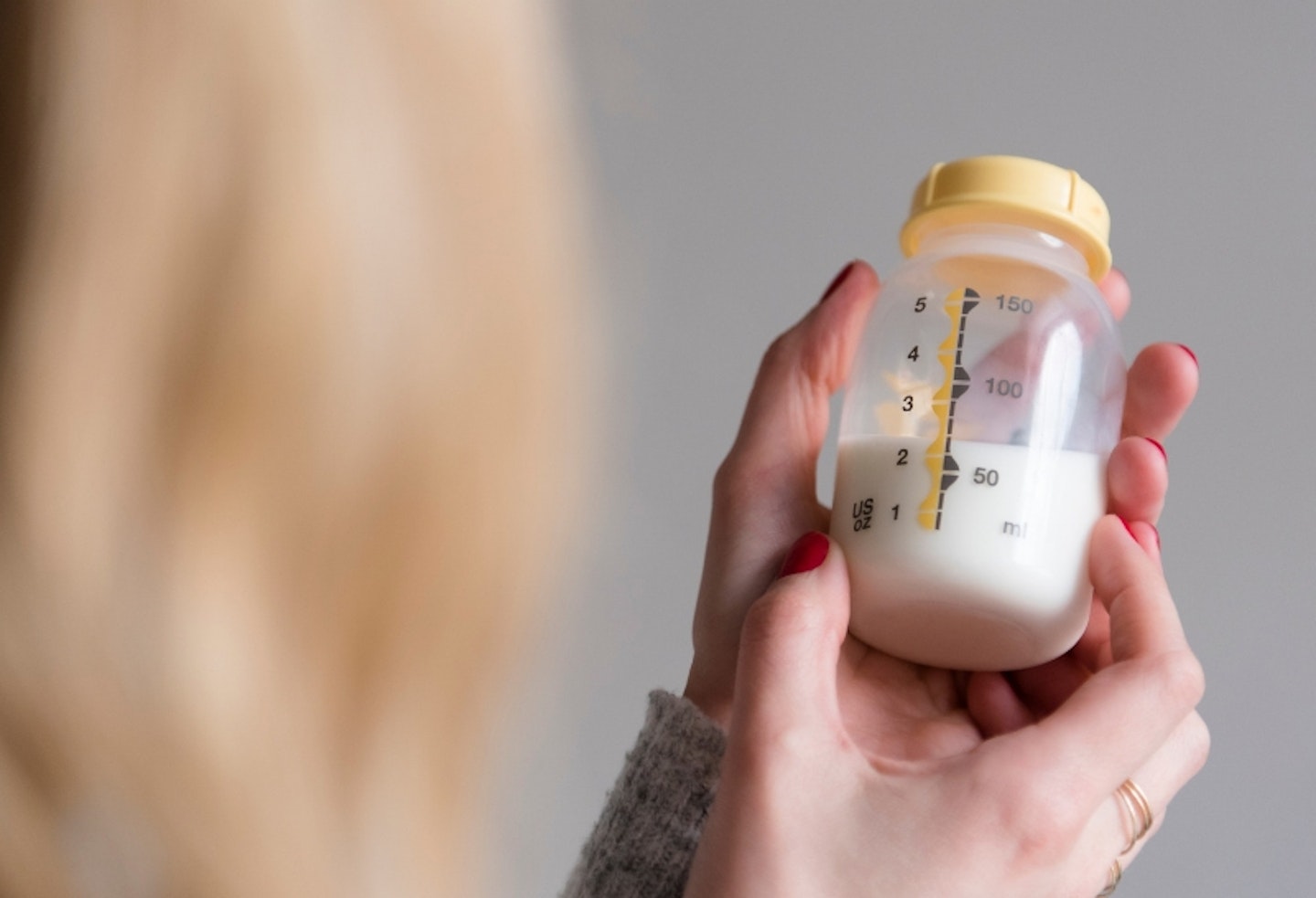We believe mums should always do whatever works for them as there is no right or wrong way to feed your child. There are many reasons why you may decide to stop breastfeeding, whether it is in the first few days as a new mum or further down the line.
It helps to consider why you want to stop breastfeeding as there may be alternative options to allow you to continue or adapt the feeding. Once you do decide to stop breastfeeding, there are particular methods to help ease the transition and recommendations from health organisations to guide you. The most important thing is that both mother and baby are healthy and happy.
Common reasons for stopping breastfeeding:
Common reasons for stopping breastfeeding
 1 of 8
1 of 81) Pain (sore, cracked nipples, thrush or mastitis)
Breastfeeding is nearly always going to be accompanied by pain as you get used to the new sensations. Most women suffer from sore or cracked nipples at some point and even mastitis, where the breast tissue becomes inflamed.
Pain during feeding can be overcome by trying different positions, feeding techniques, creams and pads designed to soothe sore nipples as well as staying hydrated. Your midwife, health visitor or a breastfeeding counsellor can advise you, but for some women, the pain is severe and they may have no choice but to stop feeding.
 2 of 8
2 of 82) Not producing enough milk
Some women are concerned that they are not producing enough breast milk for their child. In the first few days after birth, your breast milk will not be fully developed and you will be feeding your baby colostrum. Colostrum is incredibly nutrient dense and only a very small amount is required to effectively nourish your baby - so, even if it seems like hardly anything, don't worry. Health visitors will also weigh your baby to make sure they are making the right progress but every baby is different and may develop and grow at differing rates.
If you are still concerned about your milk supply down the line, you can discuss this with a healthcare professional who can check and they may recommend ways to increase your supply. More often than not, this is simply a common worry that new mums have. Generally, as long as your baby appears calm when feeding, you can hear them sucking (a few rapid sucks followed by long, rhythmic sucks and swallows with occasional pauses) and they appear satisfied or sleepy after feeds then it is generally not a cause for concern.
 3 of 8
3 of 83) Pressure from those around you
Sometimes friends or family members put pressure on new mums to stop feeding. This is usually because those around you want to make things easier for you and try to help. If new mums struggle to feed, their partner might suggest buying formula to ease the situation which may leave mums feeling hurt. Others might suggest you stop because of their previous experiences of breast or bottle feeding.
It is important that you remember breastfeeding is YOUR choice and politely ask others not to pass judgement. Mum-guilt and mum-shaming is common, even if it is unintentional. Try to stick with what you believe in - it might be possible for you to get a health professional to explain to those around you why you are feeding and how they can best support you.
 4 of 8
4 of 84) Going back to work
For many mums, returning to work after maternity leave can put a stop to breastfeeding. However, this is not always necessary. You could try expressing milk in advance with a breast pump so that someone else can feed your child when you are away or substitute some feeds with formula.
Always speak to your employer and see what options are available. There are rules that employers have to stick to and they should make it possible for you to express at work. You might even be able to stagger your return which would allow you to go home and feed your child.
 5 of 8
5 of 85) Getting pregnant
If you get pregnant whilst still feeding your baby, this should not affect the pregnancy. However, you may feel fatigued or suffer from mood swings, appetite changes or morning sickness which can make feeding more difficult.
If you have previously had a miscarriage or premature labour and are trying to get pregnant, you may be advised to stop breastfeeding. The hormone oxytocin which is released during breastfeeding can cause contractions. Speak to your GP to discuss this.
You may worry that you cannot feed two children at once, especially of differing ages. However, tandem nursing is possible and the more your children feed, the more milk your breasts will produce.
 6 of 8
6 of 86) Medication or a medical procedure
Sometimes you may be put on medication that is not compatible with breastfeeding. You may also have to stop breastfeeding due to a medical procedure or surgery. If this is the case, your doctor or surgeon will explain this to you and advice you on how to proceed.
 7 of 8
7 of 87) Feeding does not fit with your lifestyle
Some mothers find that feeds take too long and they simply do not feel breastfeeding suits their lifestyle or works for them. This is completely down to personal preference and as long as you are happy, then that is all that matters.
 8 of 8
8 of 88) Your child's age
Some people think that there is a correct time to stop feeding and that once children start weaning on solid food they should no longer be given breast milk. However, The World Health Organisation recommends that all babies are breastfed for up to two years or longer. It is completely up to you how long you feed your child for and you should try not to give in to the pressure of those around you.
When should I stop breastfeeding?
The truth is, breastfeeding does not work for everyone. For some mums, they may decide they do not want to try breastfeeding at all or they try but decide to stop early on. If you decide breastfeeding isn't for you, you can, of course, opt for formula feeding. If you attempt to breastfeed but suffer from complications or pain, always speak to your midwife, health visitor or a breastfeeding counsellor, as they can advise you.
There are guidelines and recommendations which may help you make your decision. If you do decide to breastfeed and manage it successfully, it is recommended that you give your child exclusively breast milk until they are six months old. At six months, you can begin to introduce solid food alongside breast milk, as breast milk has been found to help aid the digestion of food. The World Health Organisation also recommends that all babies are breastfed for up to two years or longer. However, the best way to judge whether to stop breastfeeding or not is by looking at whether both you and your child are happy.
How can I stop breastfeeding?
When you decide to stop breastfeeding, it is important that you do this gradually. Some women do stop instantly but this is usually during the early days or for medical reasons which cannot be helped. Immediate stopping can cause engorgement, where your breasts are full and painful which may also lead to mastitis. Mastitis causes redness, swelling, lumps, discomfort and a feeling of heat in the breasts.
If you stop breastfeeding quickly, you can express milk by hand to prevent engorgement or apply a cold compress to the breasts to reduce the blood supply and ease discomfort. Always remember to stay hydrated as reducing your water intake will not reduce your milk supply.
Stopping gradually gives your body more time to adjust to the change. Breastfeeding is not simply feeding your child, it is also comforting for them. Phasing breastfeeding out slowly gives both you and your baby time to get used to the change with less of a dramatic impact.

The best way to phase out breastfeeding is by dropping one feed at a time. You can drop any feed, night or day, depending on what suits you. Some women may stop offering breast milk but continue to provide it when their child specifically requests it (this is sometimes called child-led weaning).
If your baby is younger than a year old when you decide to stop breastfeeding, you'll still need to replace the dropped feed with formula even when they are eating solid food. NHS guidelines explain that "your baby will still need to have breast milk or formula as their main drink up to at least their first birthday." Combining formula with breastmilk is a good way to ease the transition.
Once you have dropped a feed and your baby has become used to this change (probably around a week), you can drop another feed. You can continue this process until your child is no longer breastfeeding or your child stops asking for the breast.
How long does it take to stop breastfeeding?
If you are gradually phasing out breastfeeding, a steady pace is best. However, the process depends on how well your child responds to the changes. The time it takes to stop can vary greatly - stopping breastfeeding entirely can take anything from weeks to months.

What do I do if my child does not want to stop breastfeeding?
If you find your child struggles with the change, try distracting them with a toy, game or activity. Breastfeeding is comforting to your child, so try and comfort them in other ways - try cuddling or get your partner to soothe them as they know that they cannot get milk from them. If your child requests the breast, try postponing the feed by saying you'll do it later. This might distract them and can help you drop feeds or increase the time between them.
If your child is ill or unhappy, they may be more likely to want to breastfeed. Breastfeeding can be a great support and comfort to them in times of need, so pay attention to this and pick your moments. It may set your weaning back slightly, but it is a gradual process and it is more important that your child feels happy.
Most read: The best bottles for breastfed babies
How did you stop breastfeeding? Let us know on Facebook or Twitter!
Make sure you're following Mother & Baby on Instagram for relatable memes, inspiring stories and parenting hacks!
Join the club! Introducing our brand, spankin’ new Facebook group called #mumtribe. Simply search ‘#mumtribe’ into the search bar and meet like-minded mums, win gorgeous goodies and have some fun!
Have approx 60 seconds to spare? Why not join thousands of mums-to-be and start your very own Amazon baby wish list! They're absolutely free to create and perfect to send to the friends, aunties and your mum to make sure you're getting the baby products you really need...Click here!
